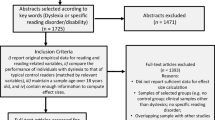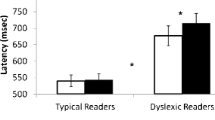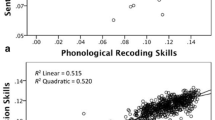Abstract
Subgroups of Finnish dyslexic adults (N = 84)displaying, relative to each other, a distinctivecombination of accuracy and speed of oral text readingwere compared in phonological and orthographicprocessing, verbal short-term memory and readinghabits. Inaccurate phonological decoding appeared todetermine the number of errors made in text reading,while inability to utilize effectively rapid lexicalaccess of words manifested as slow text reading speed.Phonological and orthographic word recognitionprocesses were less tightly integrated among dyslexicthan normal readers. Our results indicate thatadvanced orthographic processing skills might help anumber of the dyslexic readers to compensate for theirserious phonological deficits. The subgroups alsodiffered from each other in reading habits. Arelatively fast reading speed, even with numerouserrors, appears to be more rewarding in everydayreading than a slower but more accurate readingstyle.
Similar content being viewed by others
References
Aaron, P.G., Olsen, J. & Baker, C. (1985). The dyslexic college student: Is he also dysphasic? Cognitive Neuropsychology 2(2): 115-147.
Ben-Dror, I., Pollatsek, A. & Scarpati, S. (1991).Word identification in isolation and in context by college dyslexic students, Brain and Language 40: 471-490.
Besner, D., Davelaar, E., Alcott, D. & Parry, P. (1984). Wholistic reading of alphabetic print: Evidence from the FDM and the FBI. In: L. Henderson (ed.), Orthographies and reading: Perspectives from cognitive psychology, neuropsychology, and linguistics (pp. 121-135). Hillsdale, NJ: Erlbaum.
Bowers, P.G., Sunseth, K. & Golden, J. (1999). The route between rapid naming and reading progress, Scientific Studies of Reading 3: 31-53.
Bowers, P.G. & Wolf, M. (1993). Theoretical links among naming speed, precise timing mechanisms and orthographic skills in dyslexia, Reading and Writing: An Interdisciplinary Journal 5: 69-85.
Bruck, M. (1990). Word-recognition skills of adults with childhood diagnoses of dyslexia, Developmental Psychology 26: 439-454.
Bruck, M. (1992). Persistence of dyslexics' phonological awareness deficits. Developmental Psychology 28: 874-886.
Byrne, B. & Ledez, J. (1983). Phonological awareness in reading disabled adults, Australian Journal of Psychology 35: 185-197.
Carr, T.H., Brown, T.L., Vavrus, L.G. & Evans, M.A. (1990). Cognitive skill maps and cognitive skill profiles: Componential analysis of individual differences in children's reading efficiency. In: T. Carr & B.A. Levy (eds.), Reading and its development: Component skills approaches (pp. 1-55). San Diego, CA: Academic Press.
Cossu, G., Gugliotta, M. & Marshall, J. C. (1995). Acquisition of reading and written spelling in a transparent orthography: Two non parallel processes? Reading and Writing: An Interdisciplinary Journal 7: 9-22.
Cunningham, A.E. & Stanovich, K.E. (1997). Early Reading Acquisition and its relation to reading experience and ability 10 years later, Developmental Psychology 33: 934-945.
Daneman, M. & Carpenter, P.A. (1980). Individual differences in working memory and reading, Journal of Verbal Learning and Verbal Behavior 19: 450-466.
Decker, S. (1989). Cognitive processing rates among disabled and normal reading young adults: A nine year follow-up study, Reading and Writing: An Interdisciplinary Journal 2: 123-134.
Denckla, M.B. & Rudel, R.G. (1976). Rapid ‘automatized’ naming (RAN): Dyslexia differentiated from other learning disabilities, Neuropsychologia 14: 471-479.
Ehri, L.C. & Wilce, L.S. (1983). Development of word identification speed in skilled and less skilled beginning readers, Journal of Educational Psychology 75: 3-18.
Elbro, C., Nielsen, I. & Petersen, D.K. (1994). Dyslexia in adults: Evidence for deficits in nonword reading and in the phonological representation of lexical items, Annals of Dyslexia 44: 205-226.
Fawcett, A.J. & Nicolson, R.I. (1995). Persistence of phonological awareness deficits in older children with dyslexia, Reading and Writing: An Interdisciplinary Journal 7: 361-376.
Felton, R.H. & Wood, F.B. (1989). Cognitive deficits in reading disability and attention deficit disorder, Journal of Learning Disabilities 22: 3-14.
Felton, R.H., Naylor, C.E. & Wood, F.R. (1990). Neuropsychological profile of adult dyslexics, Brain and Language 39: 485-497.
Hendriks, A.W. & Kolk, H.H.J. (1997). Strategic control in developmental dyslexia, Cognitive Neuropsychology 14: 321-366.
Høien, T. & Lundberg, I. (1989). A strategy for assessing problems in word recognition among dyslexics, Scandinavian Journal of Educational Research 33: 185-201.
Karlsson, F. (1987). Finnish grammar. Helsinki: WSOY.
Kitz, W.R. & Tarver, S.G. (1989). Comparison of dyslexic and nondyslexic adults decoding and phonemic awareness tasks, Annals of Dyslexia 39: 198-205.
Korhonen, T. (1995). The persistence of rapid naming problems in children with reading disabilities: A nine-year follow-up, Journal of Learning Disabilities 28: 232-239.
Kyöstiö, O.K. (1980). Is learning to read easy in a language in which the grapheme-phoneme correspondences are regular? In: J.F. Kavanagh & R.L. Venezky (eds.), Orthography, reading and dyslexia (pp. 35-49). Baltimore: University Park Press.
Landerl, K., Frith, U. & Wimmer H. (1996). Intrusion of orthographic knowledge on phoneme awareness: Strong in normal readers, weak in dyslexic readers, Applied Psycholinguistics 17: 1-14.
Lefly, D.L. & Pennington, B.F. (1991). Spelling errors and reading fluency in compensated adult dyslexics, Annals of Dyslexia: 41, 143-162.
Lovett, M.W. (1987). A developmental approach to reading disability: Accuracy and speed criteria of normal and deficient reading skill, Child Development: 58, 234-260.
Lyon, G.R. (1995). Toward a definition of dyslexia, Annals of Dyslexia 45: 3-27.
Lyytinen, H. (1997). In search of the precursors of dyslexia: A prospective study of children at risk for reading problems. In: C. Hulme & M. Snowling (eds.), Dyslexia: Biology, cognition and intervention (pp. 97-107). London: Whurr Publishers.
Lyytinen, H., Leinonen, S., Nikula, M., Aro, M. & Leiwo, M. (1995). In search of the core features of dyslexia: Observations concerning dyslexia in the highly orthographically regular finnish language. In: V.W. Berninger (ed.), The varieties of orthographic knowledge II: Relationship to phonology, reading, and writing (pp. 177-204). Dordrecht, Netherlands: Kluwer.
Manis, F.R. (1985). Acquisition of word identification skills in normal and disabled readers, Journal of Educational Psychology 77: 78-90.
Morris, R., Blahsfield, R. & Satz, P. (1981). Neuropsychology and cluster analysis. Potentials and problems, Journal of Clinical Neuropsychology 3: 79-99.
Morton, J. & Frith, U. (1995). Causal modelling: A structural approach to developmental psychopathology. In: D. Cicchetti, & D. Cohen (eds.), Manual of developmental psychopathology, vol 1 (pp. 357-390). New York: Wiley.
Olson, R., Forsberg, H., Wise, B. & Rack, J. (1994). Measurement of word recognition, Orthographic, and phonological skills. In: G.R. Lyon (ed.), Frames of reference for the assessment of learning disabilities: New views on assessment issues (pp. 243-277). Baltimore: Paul H. Brookes.
Pennington, B.F., Van Orden, G.C., Smith, S.D., Green, P.A. & Haith, M.M. 1990). Phonological processing skills and deficit in adult dyslexics. Child Development 61: 1753-1778.
Pennington, B.F., Van Orden, G., Kirson, D. & Haith, M. (1991). What is causal relation between verbal STM problems and dyslexia? In: S.A. Brady & D.P. Shankweiler (eds.), Phonological processes in literacy. A tribute to Isabelle Y. Liberman (pp. 173-186). Hillsdale NJ: Lawrence Erlbaum.
Perfetti, C.A. & Bell, L. (1991). Phonemic activation during the first 40 ms of word identification: Evidence from backward masking and priming, Journal of Memory and Language 30: 473-485.
Pratt, A.C. & Brady, S. (1988). Relation of phonological awareness to reading disability in children and adults, Journal of Educational Psychology 80: 319-323.
Rack, J.P. (1985). Orthographic and phonetic coding in developmental dyslexia, British Journal of Psychology 76: 325-340.
Rack, J.P., Snowling, M.J. & Olson, R.K. (1992). The nonword reading deficit in developmental dyslexia: A review, Reading Research Quarterly 27: 29-53.
Raven, J.C., Court, J.H. & Raven, J. (1992). Standard progressive matrices. Oxford: Oxford Psychologists Press.
Scarborough, H.S. (1984). Continuity between childhood dyslexia and adult reading, British Journal of Psychology 75: 329-348.
Seymour, P.H.K. (1986). Cognitive analysis of dyslexia. London: Routledge & Kegan Paul.
Shafrir, U. & Siegel, L.S. (1994). Preference for visual scanning strategies versus phonological rehearsal in university students with reading disabilities, Journal of Learning Disabilities 27: 583-588.
Siegel, L.S., Share, D. & Geva, E. (1995). Evidence for superior orthographic skills in dyslexics, Psychological Science 6: 250-254.
Siegel, L.S. & Stanovich, K.E. (1998). The assessment of adults with reading disabilities: What can we learn from experimental tasks, Journal of Research in Reading 20: 42-54.
Smith, M.C. (1996). Differences in adults' reading practices and literacy proficiencies, Reading Research Quarterly 31: 196-219.
Stanovich, K.E. & Siegel, L.S. (1994). Phenotypic profile of children with reading disabilities: A regression-based test of the phonological-core variable-difference model, Journal of Educational Psychology 86: 24-53.
Statistical yearbook of Finland (1991). Official statistics of Finland. Statistics Finland, Helsinki.
Torgesen, J.K., Wagner, R.K., Simmons, K. & Laughon, P. (1990). Identifying phonological coding problems in disabled readers: Naming, counting, or span measures? Learning Disability Quarterly 13: 236-243.
Van Orden, G.C. (1987). A ROWS is a ROSE: Spelling, sound and reading, Memory and Cognition 15: 181-198.
Vellutino, F.R. & Scanlon, D. (1987). Phonological coding, phonological awareness, and reading disability: Evidence from a longitudinal and experimental study, Merrill-Palmer Quarterly 33: 321-363.
Vellutino, F.R., Scanlon, D.M. & Chen, R.S. (1995). The increasingly inextricable relationship between orthographic and phonological coding in learning to read: Some reservations about current methods of operationalizing orthographic coding. In: V. Berninger (ed.), The varietes of orthographic knowledge II: Relationships to phonology, reading, and writing (pp. 47-111). Dordrecht: Kluwer Academic Publishers.
Wagner, R.K. & Torgesen, J.J. (1987). The nature of phonological processing, and its causal role in the acquisition of reading skills, Psychological Bulletin 101: 192-212.
West, R.F., Stanovich, K.E. & Cunningham, A.E. (1995). Compensatory processes in reading. In: R.A. Dixon & L. Bäckman (eds.), Compensating for psychological deficits and declines, Managing losses and promoting gains (pp. 275-296). Mahwah, NJ: Lawrence Erlbaum.
Wimmer, H. (1993). Characteristics of developmental dyslexia in a regular writing system, Applied Psycholinguistics 14: 1-33.
Wimmer, H. (1996). The nonword reading deficit in developmental dyslexia: Evidence from children learning to read German, Journal of Experimental Child Psychology 61: 80-90.
Wolf, M., Pfeil, C., Lotz, R. & Biddle, K. (1994). Towards a more universal understanding of the developmental dyslexias: The contribution of orthographic factors. In: V.W. Berninger (ed.), The varieties of orthographic knowledge I: Theoretical and developmental issues (pp. 137-171). Dordrecht, Netherlands: Kluwer.
Wolf, M., Bowers, P. G. & Biddle, K. (1998). Naming-speed processes, timing, and reading: A conceptual review. Manuscript submitted for publication.
Wolff, P.H., Melngailis, I., Obregon, M. & Bedrosian, M. (1995). Family patterns of developmental dyslexia, Part II: Behavioral phenotypes, American Journal of Medical Genetics (Neuropsychiatric Genetics) 60: 494-505.
Young, A. & Bowers, P.G. (1995). Individual difference and text difficulty determinants of reading fluency and expressiveness, Journal of Experimental Child Psychology 60: 428-455.
Author information
Authors and Affiliations
Rights and permissions
About this article
Cite this article
Leinonen, S., Müller, K., Leppänen, P.H. et al. Heterogeneity in adult dyslexic readers: Relating processing skills to the speed and accuracy of oral text reading. Reading and Writing 14, 265–296 (2001). https://doi.org/10.1023/A:1011117620895
Issue Date:
DOI: https://doi.org/10.1023/A:1011117620895




